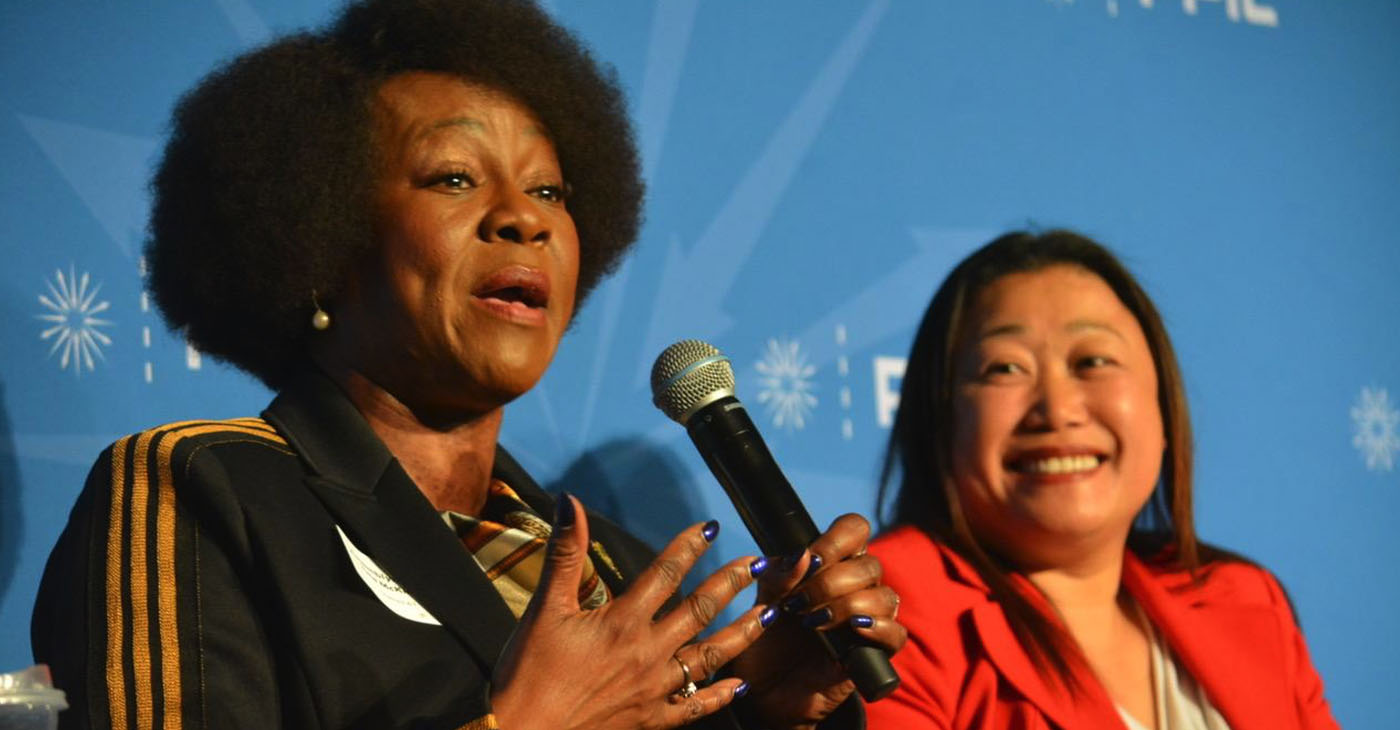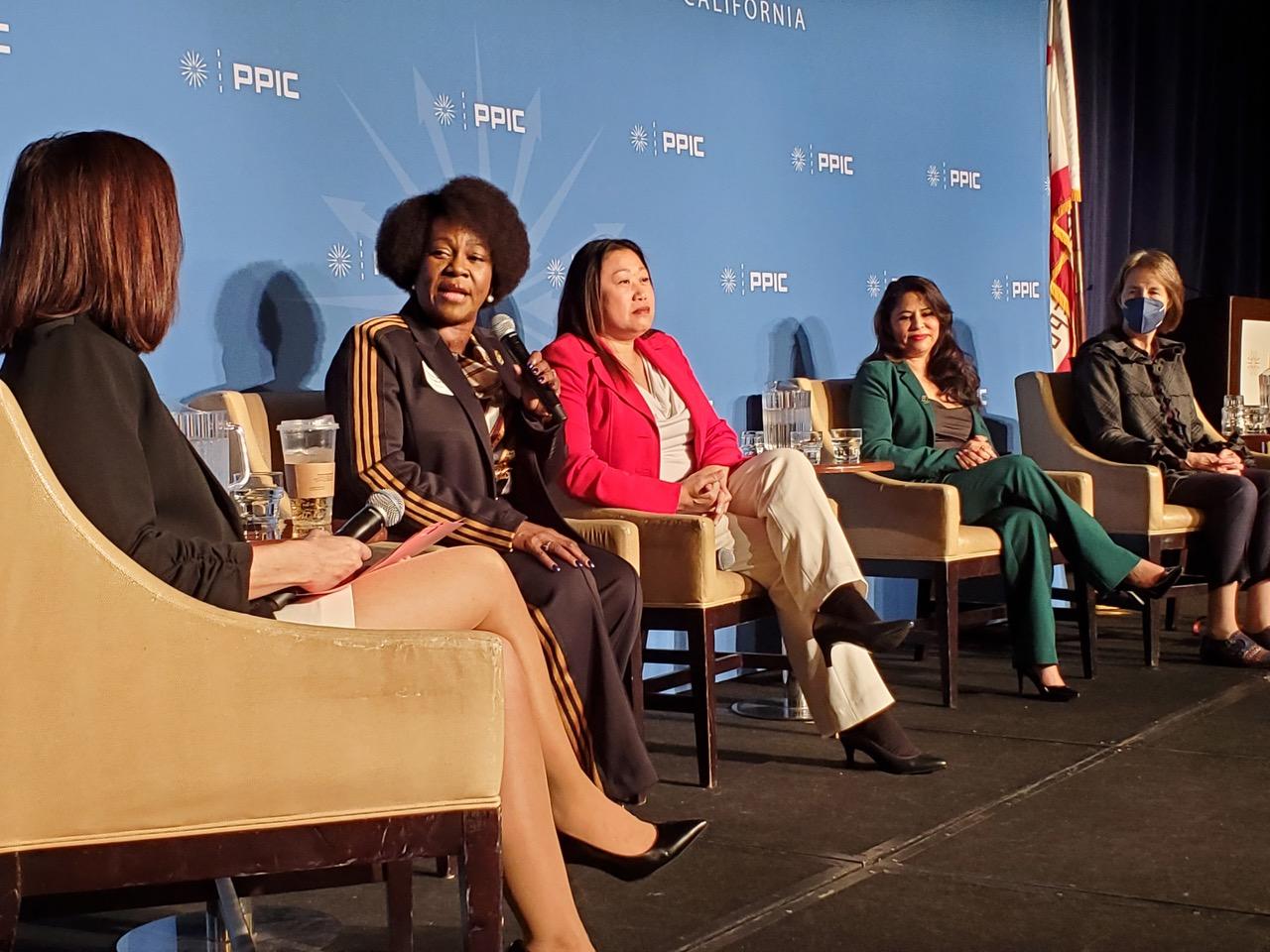Antonio Ray Harvey
Women’s History Month: Assemblywoman McKinnor Joins Panel of Legislators at Sacramento Event
Last week, Assemblymember Tina McKinnor (D-Inglewood) joined a diverse panel of women legislators at the “Women in California’s Legislature: 2023 Speaker Series on California’s Future” luncheon to discuss the essential roles they play in shaping governmental policies benefiting Californians. The event was hosted by the Public Policy Institute of California (PPIC) at the Sheraton Grand Hotel in Sacramento.

By Antonio Ray Harvey
California Black Media
Last week, Assemblymember Tina McKinnor (D-Inglewood) joined a diverse panel of women legislators at the “Women in California’s Legislature: 2023 Speaker Series on California’s Future” luncheon to discuss the essential roles they play in shaping governmental policies benefiting Californians.
The event was hosted by the Public Policy Institute of California (PPIC) at the Sheraton Grand Hotel in Sacramento.
This year’s class of legislators includes the largest number of women in state history — 18 senators and 32 assemblymembers. Joining McKinnor on the panel were state Senators Janet Nguyen (R-Garden Grove), Nancy Skinner (D-Berkeley) and Assemblymember Liz Ortega (D-San Leandro).
McKinnor said she made the decision to get into politics after seeing the video of police officers beating motorist Rodney King in Los Angeles in 1992.
Over the years, McKinnor said, a major influence on her policy decisions are the lessons gleaned from raising a family.
“I think (women) bring diversity to the table because we are about taking care of our families,” McKinnor said. “So, the legislation that you see coming out of this (panel), I believe, will be around housing, jobs, equity and public safety. The women here are going to make a tremendous difference because we take care of our families differently.”
Before McKinnor was elected to the California State Assembly in June 2022, she served as civic engagement director for the nonprofit LA Voice and previously served as operational director for the California Democratic Party and chief of staff to several members of the State Assembly. She received a Bachelor of Arts degree in accounting from California State University Dominguez Hills.

Left, Former Supreme Court Chief Justice Tani Cantil-Sakauye, PPIC’s president and chief executive officer, was the moderator of the event. Left to right, Assemblymember Tina McKinnor (D-Inglewood), District 61; state Sen. Janet Nguyen (R-Garden Grove), District 36; Assemblywoman Liz Ortega (D-San Leandro), District 20; and Sen. Nancy Skinner (D-Berkeley) of District 9. The Women in California’s Legislature event was hosted by PPIC in Sacramento on March 8, 2023. CBM photo by Antonio Ray Harvey.
McKinnor is currently chair of the Public Employment and Retirement Committee. She serves on other policy committees, including the Business and Professions Committee, Environmental Safety and Toxic Materials Committee and the Governmental Organization Committee.
McKinnor’s legislative priorities include California’s continued COVID-19 recovery, increased funding for public education, expanded universal access to healthcare, the state’s housing and homelessness crisis and reforming the state’s criminal justice system.
“I never thought I’d be in politics in 1992. I thought I had better get off the sofa and pay attention to what’s going on,” McKinnor said. “After that, I didn’t sit down, and I got involved in the community.”
Black women are 7.7% of the total U.S. population and 15.3% of the total number of women in the country, according to the U.S. Census.
In the 2021 study, the State Innovation Exchange (SIE) — a group that advocates for representation in state legislatures — and the National Organization for Black Elected Legislative Women (NOBEL Women) took a deep dive into their analysis of women serving in government.
SIE and NOBEL Women reported that Black women fill just 4.82% (356) of 7,383 state Legislature seats across the United States. That same year, eight state legislatures convened without a single Black woman in their ranks: Vermont, South Dakota, Hawaii, Arizona, Idaho, Nebraska, Montana, and North Dakota — all places with Black populations falling in a range from 2% to 6%, the study revealed.
Currently, there are five Black women in the California Legislature: McKinnor and Assemblymembers Lori D. Wilson (D-Suisun City), Mia Bonta (D-Alameda), Akilah Weber (D-La Mesa) and Sen. Lola Smallwood-Cuevas (D-Ladera Heights). They are also members of the California Legislature Black Caucus.
Smallwood-Cuevas is the lone Black woman among 40 state senators.
“I am the 20th Black woman to be elected to the (California) Legislature,” McKinnor said at the event held on International Women’s Day. “Sen. Lola Smallwood became the 21st Black woman. So, we still have a lot of work to do.”
PPIC, the nonprofit that organized the event, bills itself as a nonpartisan think tank with a mission to inform and improve public policy in California through independent, objective, nonpartisan research. Former California Supreme Court Chief Justice Tani Cantil-Sakauye is PPIC’s president and chief executive officer.
Ophelia Basgal, an affiliate at the Terner Center for Housing Innovation at University of California, Berkeley, and a senior executive consultant for Inclusion INC, provided the opening remarks.
All the women legislators who participated in the event are members of the California Legislative Women’s Caucus, a political body that represents and advocates on the behalf of the diverse interests of women, children, and families.
The panelists discussed gender diversity in state politics, how personal interests play out in politics, legislation they are currently working on, setting better policy for the state, and offered advice to women who are interested in running for office.
“In addition to the vision and experience, we bring that voice into the room that is often unheard and unseen,” said Ortega, a longtime labor leader and activist from an immigrant family. “We will make sure we are seen and heard and deliver (policies) for all in the state of California and the United States.”
The Sheraton Ballroom in downtown Sacramento was filled with women and men listening to the 60-minute conversation between the women that was at times passionate, thought-provoking, reflective and lighthearted.
“We’ve been truly inspired by this distinguished panel for their questions, insight, and answers,” Cantil-Sakauye said to the audience. “Thank you for making this (speakers’ series) memorable.”
Antonio Ray Harvey
Will Gov. Newsom’s New Film and TV Tax Credit Prioritize Diversity?
Assemblymember Mike Gipson (D-Carson), a member of the California Legislative Black Caucus (CLBC) says he supports Gov. Gavin Newsom’s proposal to expand the state’s Film and Television Tax Credit Program from its current $330 million annual budget allocation to $750 million. Gipson, who is chair of the Assembly Committee on Arts, Entertainment, Sports, and Tourism, says, historically, that tax credit has aimed to increase diversity, equity, and inclusion” as outlined in SB 132.

By Antonio Ray Harvey, California Black Media
Assemblymember Mike Gipson (D-Carson), a member of the California Legislative Black Caucus (CLBC) says he supports Gov. Gavin Newsom’s proposal to expand the state’s Film and Television Tax Credit Program from its current $330 million annual budget allocation to $750 million.
Gipson, who is chair of the Assembly Committee on Arts, Entertainment, Sports, and Tourism, says, historically, that tax credit has aimed to increase diversity, equity, and inclusion” as outlined in SB 132.
He’s counting on it to continue making diversity a priority.
“The Legislature finds and declares an overall trend toward increasing diversity based on existing research on diversity in the motion picture production and television industry,” the bill language states.
In a statement, Gipson told California Black Media (CBM) the tax credit, “would allow our state to be more competitive against states with tax incentive programs of their own, such as Georgia, New York, and New Mexico.”
“The film and television industry is iconic to California, impacting thousands of jobs for below-the-line workers on film and television crews, as well as many others working in hair and make-up, food services and transportation, costume and set design, and more,” Gipson continued.
According to the Governor’s office, the increase would uplift the state for capped film incentive programs, surpassing other states. Gipson says he agrees with Newsom’s assessment and the notion that the program would bring more business back to California.
“California is the entertainment capital of the world, rooted in decades of creativity, innovation, and unparalleled talent,” said Newsom on Oct 27 in L.A. at the unveiling of the tax credit.
Newsom’s tax credit proposal is expected to appear as a bill during the next legislative session, raising concerns about diversity, equity, and inclusion for some lawmakers and advocates.
Gipson’s CLBC colleagues Sen. Lola Smallwood-Cuevas (D-Los Angeles) and Assemblymember Tina McKinnor (D-Inglewood) led a faction of legislators who demanded answers from Hollywood last year after several Black women left high-profile executive positions in Hollywood.
A number of those Black executives who left those prominent roles were leading DEI initiatives at major entertainment companies such as Netflix, Disney, British Broadcasting Company, Warner Bros., and the Academy of Motion Pictures Arts and Sciences.
Speaking on behalf of Black, Indigenous, and People of Color (BIPOC) employed in the industry, McKinnor and Smallwood Cuevas insist on holding television and film studio executives accountable as they benefit from taxpayer support but often appear reluctant to support Diversity, Equity and Inclusion initiatives.
“I was highly offended to see the industry’s response to a $1.6 billion tax subsidy by quietly eliminating Black women from executive positions with a number of studios,” said McKinnor. “Many of these women were involved in their studios’ diversity, equity, and inclusion efforts, which raises a serious question about their commitment to diversity, equity, and inclusion in the film industry.”
The legislation for this year’s tax credit program has not been written, but Gipson’s staff has indicated that he will not introduce it – even though the issue is close to his heart.
“I applaud the work being done by the California Film Commission, the studios, and the entertainment unions, and I look forward to supporting this proposal next year as it moves through the legislative process,” Gipson said.
Antonio Ray Harvey
Feds: California Will Be Home to New National Semiconductor Technology Center
California was chosen by the U.S. Department of Commerce (Commerce) and Natcast, the operator of the National Semiconductor Technology Center (NSTC) to be home to the headquarters for the National Semiconductor Technology Center – as part of the Biden-Harris Admin’s CHIPS and Science Act. The CHIPS for America Design and Collaboration Facility (DCF) will be one of three CHIPS for America research and design (R&D) facilities and will also operate as the headquarters for the NTSC and Natcast.

By Antonio Ray Harvey
California was chosen by the U.S. Department of Commerce (Commerce) and Natcast, the operator of the National Semiconductor Technology Center (NSTC) to be home to the headquarters for the National Semiconductor Technology Center – as part of the Biden-Harris Admin’s CHIPS and Science Act.
The CHIPS for America Design and Collaboration Facility (DCF) will be one of three CHIPS for America research and design (R&D) facilities and will also operate as the headquarters for the NTSC and Natcast.
“We are thrilled that the Department of Commerce and Natcast chose to locate this critically important facility in Sunnyvale, the heart of the Silicon Valley, alongside the world’s largest concentration of semiconductor businesses, talent, intellectual property, and investment activity,” said Dee Dee Myers, Senior Economic Advisor to Gov. Gavin Newsom and Director of the Governor’s Office of Business and Economic Development (GO-Biz). “The Newsom Administration and our partners across the industry know how important it is to shorten the timeframe from R&D to commercialization.”
According to GO-Biz, the DCF is expected to direct over $1 billion in research funding and create more than 200 employees in the next decade. The facility will serve as the center for advanced semiconductor research in chip design, electronic design automation, chip and system architecture, and hardware security. The CHF will be essential to the country’s semiconductor workforce development efforts.
As detailed in the released NSTC Strategic Plan, the DCF will suppress the obstacles to “semiconductor prototyping, experimentation,” and other R&D activities that will enhance the country’s global power and leadership in design, materials, and process innovation while enabling a vigorous domestic industr“Establishing the NSTC headquarters and design hub in California will capitalize on our state’s unparalleled assets to grow a highly skilled workforce and develop next-generation advancements,” stated U.S. Sen. Alex Padilla (D-Calif.). “This CHIPS Act funding will propel emerging technologies and protect America’s global semiconductor leadership, all while bringing good-paying jobs to our state.”
Antonio Ray Harvey
Black Leaders, Political Orgs, Sound Alarm About Project 2025
With the general elections just a few days away, Black organizations and leaders, including Rep. Maxine Waters (D-CA-43), are sounding the alarm about Project 2025, the Heritage Foundation’s controversial “policy bible.” The four-pillar initiative includes a detailed blueprint for the next conservative presidential administration – making way for a sweeping overhaul of the executive branch.

By Antonio Ray Harvey, California Black Media
With the general elections just a few days away, Black organizations and leaders, including Rep. Maxine Waters (D-CA-43), are sounding the alarm about Project 2025, the Heritage Foundation’s controversial “policy bible.”
The four-pillar initiative includes a detailed blueprint for the next conservative presidential administration – making way for a sweeping overhaul of the executive branch.
Waters has been outspoken in her opposition of the 900-page policy.
Recently, she shared “The People’s Guide to Project 2025” with the Inglewood Area Ministers Association, an organization of predominantly Black pastors, to inform them about the proposal’s impact, emphasizing that its influence would reach beyond the traditional spheres of presidential power. The 15-term politician from Los Angeles shared her sentiments with the House Financial Services Committee in July.
“Project 2025 promotes radical ideals to materially undermine the Federal Reserve, if not effectively abolish it,” Waters said.
Written by the Heritage Foundation, Project 2025 was developed with the input of a broad coalition of conservative organizations and is organized around four pillars: Policy, Personnel, Training, and the 180-Day Playbook. The proposals in the document aim to revamp every aspect of the U.S. government.
Waters is not the only person sounding the alarm about Project 2025’s agenda. Grassroot organizations in California and across the nation are preparing to combat the initiative despite who wins the election between Trump and U.S. Vice President Kamala Harris.
The National Assembly of American Slavery Descendants (NAASD), members of advocacy groups in California, and other Black political organizations across the nation are drawing up policy documents to counter the conservative Project 2025 initiative.
On Aug. 2, NAASD hosted a nationwide ZOOM conference call to discuss policies that concern Black communities. Nocola Hemphill, the president and chief executive officer of the U.S. Black Women’s Chamber, and grassroots organizations on the call are promoting what they call, #Reparations2025.
“I just want us to think about bringing all policies (ideas) together when we think about Project 2025,” said Hemphill, who lives in South Carolina. “I am excited about the possibility of us forming our own version of Project 2025 and having it published by the November election.”
NAASD is a nonprofit association of community activists from across the country that formed around May 2019.
Los Angeles resident Khansa “Friday” Jones Muhammad is the president of NAASD.
“The National Assembly of American Slavery Descendants (NAASD) envisions a nation where African American descendants of US slavery can fully exercise their constitutional citizenship rights and have economic agency for generations,” Muhammad told California Black Media (CBM).
While forming an agenda for #Reparation2025, NAASD has created a survey to determine how systemic racism and discrimination in the United States have affected Black American lives and single out options to repair harms through public policy. Participants in the survey would help the organization shape a national blueprint.
“During this election cycle, it is imperative that national Black organizations come together for collective success,” Muhammad shared with CBM. “While the vote for President of the United States is important, we need to also focus on other active projects such as ‘Project 2025,’ Supreme Court rulings around race and more.”
Muhammad added, “NAASD’s Black experience survey allows for individuals, Black organizations, and their allies to forge a pathway to reparations by utilizing community-building and policy.”
-

 Alameda County4 weeks ago
Alameda County4 weeks agoAlameda County District Attorney Pamela Price Announces $7.5 Million Settlement Agreement with Walmart
-

 Activism3 weeks ago
Activism3 weeks ago‘Jim Crow Was and Remains Real in Alameda County (and) It Is What We Are Challenging and Trying to Fix Every Day,’ Says D.A. Pamela Price
-

 Bay Area4 weeks ago
Bay Area4 weeks agoIn the City Attorney Race, Ryan Richardson Is Better for Oakland
-

 Activism3 weeks ago
Activism3 weeks agoOakland Post: Week of October 30 – November 5, 2024
-

 Alameda County3 weeks ago
Alameda County3 weeks agoD.A. Price Charges Coliseum Flea Market Vendors in Organized Retail Theft Case
-

 Activism3 weeks ago
Activism3 weeks ago‘Criminal Justice Reform Is the Signature Civil Rights Issue of Our Time,’ says D.A. Pamela Price
-

 Activism3 weeks ago
Activism3 weeks ago“Two things can be true at once.” An Afro-Latina Voter Weighs in on Identity and Politics
-

 Activism2 weeks ago
Activism2 weeks agoLIVE! — TOWN HALL ON RACISM AND ITS IMPACT — THURS. 11.14.24 5PM PST














































